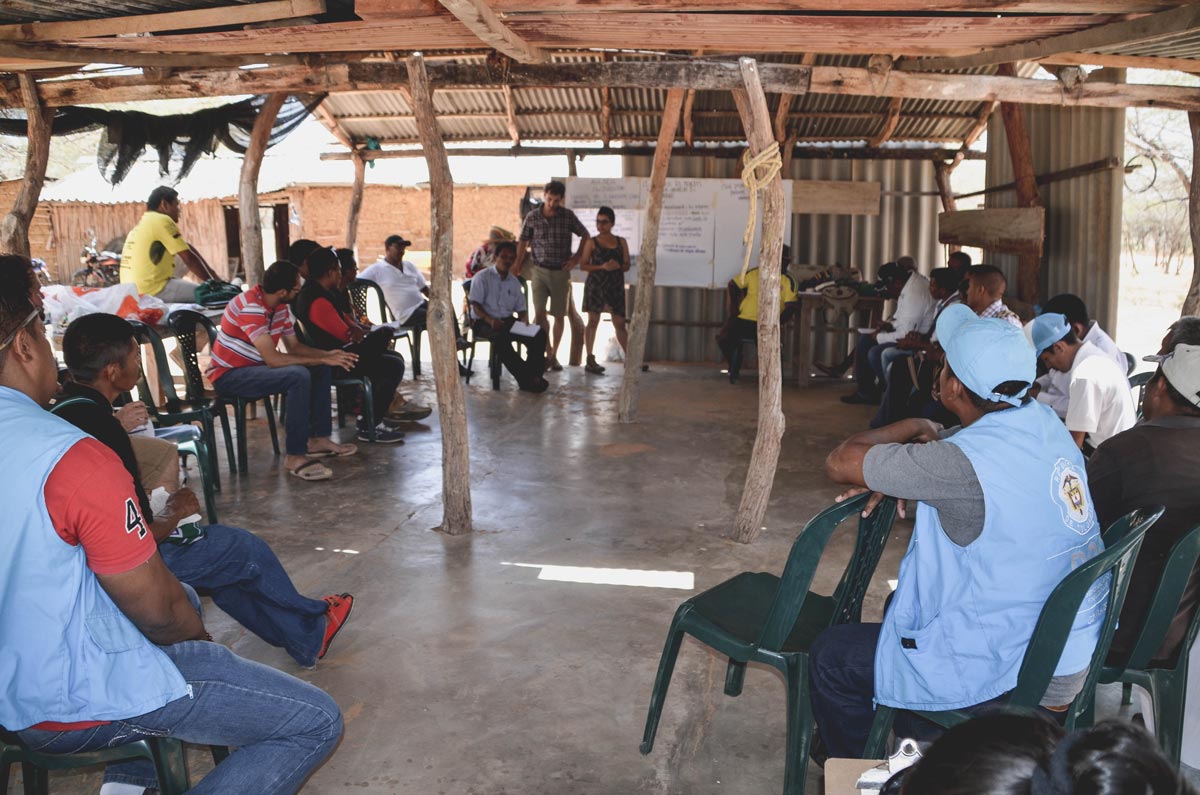
01 May Development of ASPEWA – Territorial Association of Wayuu Evangelical Pastors and Leaders
In the semi-desert Guajira Peninsula of Northern Colombia, due to new political, economic, environmental, and social pressures, the Wayuu tribe is being threatened like never before. As Ricaurte Enriquez a pastor from the Wayuu denomination INDIEWACOL adamantly explains, “Because of macro forces the social fabric of our communities is beginning to tear. Our vision is that the church take the lead on defending life in our God-given territory”.
The cornerstone of this vision is the creation of a territorial association of Wayuu evangelical pastors and leaders (ASPEWA) that has the four-fold aim: 1) to contribute to the growth, strengthening and consolidation of the Wayuu church; 2) to offer holistic training to Wayuu pastors and leaders; 3) to interact and dialogue with local, regional and international actors with presence and or influence in the Wayuu territory; and 4) to seek financial support and manage projects in the Wayuu territory.
To date the association is made up of 22 church leaders from 9 different denominations (170 churches) from across the Wayuu territory (Colombia and Venezuela), however the hope is that all of the more than 50 evangelical denominations in the region eventually become active and benefiting members.
For the last year, the Wájaro Foundation with support from the South American Mission (SAM)11 has been getting to know ASPEWA and the regional context, and has facilitated a series of workshops with 22 members (denominational leaders from around the Wayuu territory) of ASPEWA. The aim of this short-term accompaniment has been to begin cultivating some of the fundamental elements that are necessary for the development of ASPEWA (trust between participants, awareness about working collectively as it relates to the regional context, and appropriation of the vision), to clarify the ASPEWA’s objectives and develop corresponding “action plans”, and to parallely gather sufficient inputs and information with which to create a longer-term vision for continued accompaniment of ASPEWA.
The following explains the five prioritized focuses for Wájaro’s accompaniment of ASPEWA for the coming three years:
-
Holistic formation of pastors and leaders of member denominations.
ASPEWA envisions the Wayuu territory being transformed by pastors who are equipped and capable of not only leading their respective churches but also their communities. For this to occur, there is a great need for holistic formation of these same pastors. Holistic formation as envisioned by the leadership of ASPEWA includes the following topics: theology, stewardship, leadership, project management, indigenous issues, and environmental issues.
-
Pilot entrepreneurial initiative with Wayuu women that make artisan goods.
Due to drought and other factors, basic sustenance in the Wayuu territory is a challenging and time consuming undertaking. One consequence has been denominations and pastors unable to give themselves wholly to their ministry vocation. For this reason, ASPEWA has expressed a great deal of interest in activities that generate income for member denominations and their pastors, and the association. Instead of introducing new income generating activities, the strategy of this initiative is to build on the capacity and structure that the Wayuu already have to make and sell artisan goods. Before making any significant commitments, a market study and sales probe will be carried out. Upon their completion we will evaluate the viability of the initiative and either move forward, or identify new possibilities.
-
Promotion of ASPEWA.
Currently ASPEWA is comprised of 9 denominations that are made up of approximately 170 churches. This is a considerable start, but still only about 20% of the evangelical churches and denominations that exist in the Wayuu territory. Thus ASPEWA has prioritized the need to continue promoting the organization within the territory and formalizing connections with national church and indigenous organizations that further legitimize the association. Promotion will consist of designing and creating visual materials such as brochures, videos, social media, etc, connecting with potential partner organizations, visiting churches, and hosting regional meetings, amongst others.
-
Accompany the implementation of short-projects with funds from different organizations and churches working in the region through ASPEWA.
These projects will serve as a kind practicum for ASPEWA to learn how to coordinate amongst its member churches and administer projects. In addition, these kinds of short-term projects will make visible to the general population some of the benefit of becoming a member of ASPEWA and meet the felt needs of Wayuu communities which will maintain and create new enthusiasm around the association.
-
Organizational strengthening of ASPEWA.
ASPEWA is still in its infancy stage. Though it has strong leadership, it’s still vulnerable to burning out if the rest of the membership don’t develop the capacity to help carry the load or drowning if too much attention (and money) is thrown at it, too quickly. For this reason, developing organizational capacity (skills needed for healthy dialogue, leadership and participation, critical analysis, decision-making, action planning, administration, financial management, monitoring and evaluation, planning, and reporting) will continue to be a priority. Though WÁFO, could offer this kind of technical support, there are other entities that specialize in organizational capacity building and are positioned better to do so. WÁFO will act as a connector between technical support offered by “other” organizations and ASPEWA.
11. For more information visit http://southamericamission.org/

